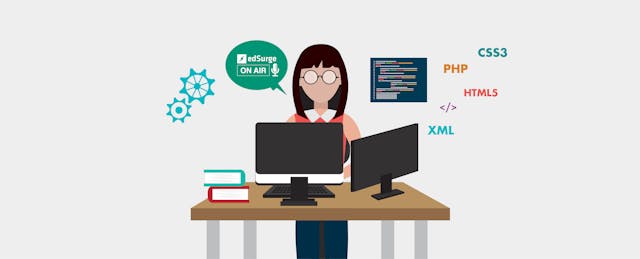Josh Paley, a computer science educator at Gunn High School in Palo Alto, tasked one of his top students with manning the computer science booth at Gunn’s annual activities fair. The student made the case for computer science to anyone who would listen. Afterwards, she came to her teacher. Every time she said the word “computer,” girls would turn away and boys would light up. Girls would ask her, “How can you take this class?” Whether that was a questioning ridicule or genuine disbelief wasn’t clear. Paley’s student told him she didn’t want the stereotypes to be true, but she couldn’t avoid the evidence: her female classmates showed no interest.
Girls are underrepresented in computer science education and professions. According to the National Science Board’s “Science and Engineering Indicators for 2012,” women make up only 26% of Computer Science and Mathematical Science professionals in the United States.
Believing that number begins with computer science education, we dove deep into the challenges girls face when learning and teaching computer science this week.
We also solicited resources from our two female computer science educators: Ann Greyson, Chair of the Department of Computer Science and Engineering at Castilleja School, and Saman Akhtar, computer science teacher at KIPP IT Academy.
- Castilleja’s CS and Engineering Department in Independent School Magazine
- the Castilleja CS & Engineering Department webpage
Her resource recommendations for girls’ computer science and engineering education:
- CSTA (Computer Science Teachers Association)
- NCWIT (National Center for Women & Information Technology)
- ACM-W (Association for Computing Machinery)
- Anita Borg Institute
- The Ada Project
- Women in Programming
- Computer Scientists of the African Diaspora
- Girls Who Code
- Black Girls Code
- Made w/ Code
- Technovation (mobile apps competition for girls)
- Girl Develop It
Saman Akhtar recommends:
- A study by Google in collaboration with Gallup: Searching for Computer Science
- A report on perceptions of computer science among students, parents, and educators.
Popular computer science teacher blogs:
AP Computer Science Principles resources:
"The following programs, developed under CE21 and STEM+C, include both curricula and professional development components," Akhtar said, "Which work hand in hand to bring AP Computer Science Principles alive for students:"
- Beauty and Joy of Computing (BJC) – bjc.berkeley.edu
- Mobile CS Principles – mobile-csp.org
- Thriving in Our Digital World – uteach-institute.org/cs/digitalworld
Professional development for these programs, and other computer science resources developed with NSF funding, will be available later this fall. For more information, visit letsteachcs.org.


